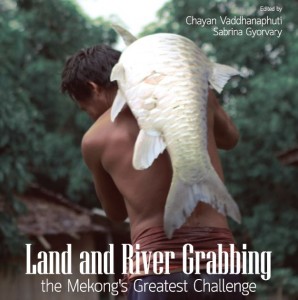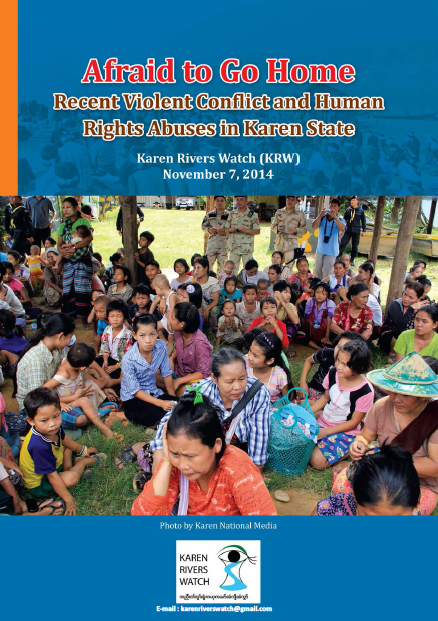Posts Tagged ‘Hatgyi Dam’ (9 found)
Land and River Grabbing: The Mekong’s Greatest Challenge
07-Land-and-River-Grabbing-2015 sm  Throughout the Mekong region, large-scale development projects such as hydropower dams, mines, conventional power plants, and mono-crop plantations are displacing communities and limiting access to natural resources. Several hydropower dams have already been built on the Upper Mekong in China’s Yunnan Province, and the governments of Cambodia, Laos and Thailand are planning eleven additional large dams on the Mekong River’s mainstream. If completed, these dams would not only destroy local ecosystems, but also reduce the fl ow of silt throughout the Mekong River system, and block major fi sh migrations, placing at risk over sixty million people who depend on the Mekong for their food security and income […]
Throughout the Mekong region, large-scale development projects such as hydropower dams, mines, conventional power plants, and mono-crop plantations are displacing communities and limiting access to natural resources. Several hydropower dams have already been built on the Upper Mekong in China’s Yunnan Province, and the governments of Cambodia, Laos and Thailand are planning eleven additional large dams on the Mekong River’s mainstream. If completed, these dams would not only destroy local ecosystems, but also reduce the fl ow of silt throughout the Mekong River system, and block major fi sh migrations, placing at risk over sixty million people who depend on the Mekong for their food security and income […]
Ethnic Communities: Salween Dams are Fueling War and Must be stopped
Community representatives from Shan, Karenni, Karen and Mon States are handing a petition today to the Myanmar Ministry of Electric Power, and to the Chinese and Thai Embassies in Yangon, urging an immediate halt to dam projects on the Salween River, which are fuelling war and violating the rights of local peoples […]
• • •Afraid to Go Home: Recent Violent Conflict and Human Rights Abuses in Karen State
The following report was prepared by Karen Rivers Watch (KRW), a coalition of six Karen organizations focused on the environment, women, youth, human rights and development issues. More information about KRW is provided on page 14.
This report is based on field interviews with local villagers and leaders of Karen armed groups, as well as media coverage of the recent conflict. It describes events that led to recent armed conflict between the Democratic Karen Benevolent Army (DKBA) and the combined force of the Burmese Army (BA) and Border Guard Force (BGF) in Karen State. Next, the report gives a detailed account of clashes that occurred along the Salween River in Hpa-an and Hpapun (Mutraw) districts. […]
• • •New Report Documents Recent Violent Conflict in Karen State
New Report Documents Recent Violent Conflict in Karen State
More than 2,000 villagers were displaced in October as fighting resumed in Karen State, the site of the world’s longest-running civil war. A report released today by Karen Rivers Watch (KRW) reveals that the outbreak of fighting – after two years of ceasefire negotiations […]
Investors’ Haste to Build Big Dams is Undermining Fragile Peace Process in Karen State
The push by investors to proceed with large dams in Karen areas of Burma is threatening to undermine ongoing ceasefire negotiations between the Karen National Union (KNU) and the Burmese government.
Increased Burma Army security around dam sites and blatant disregard for concerns of impacted communities are heightening tensions, and throwing into doubt the government’s sincerity in conducting ceasefire talks […]
• • •An Open Letter in Support of the President of Myanmar’s Decision on the Suspension of the Myitsone Dam Project and a Call for a Review of the Hatgyi Dam Project in Kayin (Karen) State
We, the members of Karen Rivers Watch wish to express our appreciation of your government’s decision on the suspension of the Myitsone Dam project in Kachin State . Karen Rivers Watch sees this decision as an important step towards […]
• • •Stop Damming Burma’s Rivers
Burma Rivers Network is calling on foreign investors to immediately stop plans to build large dams on Burma’s major rivers and their tributaries, as these dams will have huge social and environmental impacts across the country, and fuel Burma’s decades-long civil war […]
• • •KNU Update on Impacts Resulting from Hatgyi Dam Construction
On August 4th, 2009 we, the KNU, issued a statement concerning the Hatgyi dam construction project. In the statement, we called upon the countries investing in construction of the dam to withdraw their investment as the construction of the dam would cause massive damage to the environment and bring on widespread human rights violations against local populations in the form of burning down of villages, looting of property, crop destruction, killing of livestock, extortion of money, torture and killing of suspects, rape of women, forced relocation and forced labor by troops of the SPDC military dictatorship […]
• • •Salween Watch (Vol.2)
The latest newsletter from the Salween Watch coalition gives an update on the Thai Prime Minister’s directive to study the impacts of the Hatgyi Dam, a new agreement on the upper Kunlong dam, and China’s plans to build seven new dams in eastern Shan State on tributaries of the Salween and Mekong rivers. There is […]
• • •









 All posts
All posts